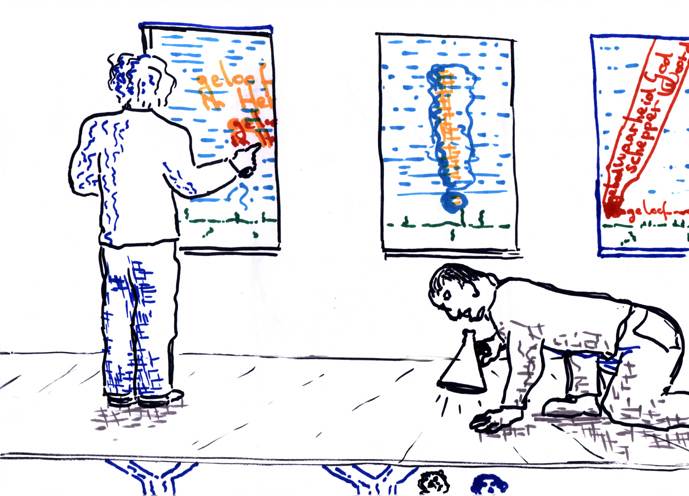Once I read on an internet forum a parable on knowledge and life. A young man said, that our present life may be compared to a house without doors and windows. Fully locked. Only the attic has windows, and a very small select group has the key to this attic. The rest of the people have no access. Now, on this attic, there's a series of windows, and each person who gained access to the attic, goes standing in front of a window. So they each have a more or less different view on the reality outdoors; slightly different from the person standing at the next window. These few, select people talk through the floor with the people in the rest of the house. So the people downstairs must choose, which of the selected people on the attic have the best view on reality outdoors. Some say: Outside is Allah; others say outside is/are the Father, the Son and the holy Spirit; again others say outside is nothing at all. We must take into account that the reception of a message through the floor will always be somewhat distorted. So we must always interpret the words and make choices. We must always have the honesty to acknowledge we might be wrong. (Thanks to ‘raden’, http://www.maghrebonline.nl)
I find it a very adequate description of religious knowledge and those who guide it. The attic of the house functions as an ivory tower. I might add another floor tot the house: A second level between the large group of the ordinary people and the selected few on the attic: A level for scholars, who do a job of explaining and teaching the information to the ordinary people. Perhaps it's a split level-floor. The scholarly floor has open communication with the lower floor through doors and stairs. New scholars will be recruited and trained from the ordinary lower floor people. Also, a people’s leader may originate from the ordinary people. The chosen few on the attic may not descend from the elites.
This means that none of us view the complete picture on reality and that is the main challenge for humanity. How to accept that?
Knowledge--to know something--means to be witness of a phenomenon. One may observe a cloud in the sky, have read the works of an author, and have absorbed their contents. Then, one may be able to interpret the observation or writings, based on the experiences from the observation process. There are many degrees in knowledge. How far our knowledge reaches, depends on our experience; help from others with expert knowledge; our own intellect; and not in the least, documentation of previous observations. The tricky part is the last aspect. Natural phenomena listen to a logical and systematic set of general rules which we call the laws of nature, but not necessarily so unique events. Unique events that do not repeat themselves, are not necessarily supernatural miracles or strange events. They may be events in human history, like the birth of a king, or tsunamis, and constellations of planets that rarely occur. When not documented nor leaving traces, they go lost to latter generations of people. It does not make them non-scientific fabrications. The realm of religion is the unique event: A prophet or messenger comes and passes on a message from the divine power. The fact, that in different periods of time and among different peoples a prophet appeared, gives religion this aspect of unreliability--in the eyes of some. This demonstrates, that two kinds of knowledge exist: Scientific and philosophical knowledge. Both have in common, that their knowledge is gained through witness and interpretation of a phenomenon. Yet, for a good reason we say that paper is patient. Paper is a material that people can produce thanks to their knowledge of a production process, and paper is paper, repeatedly and without deviation. Its qualities respond to certain hard scientific characteristics. However, the purpose of use and the qualities this paper must have, are based on people’s demands. People’s thinking is not constant, it is based on the changing state of the human mind. The human mind is one of the starting points of philosophy. ‘How to’-questions are answered by natural sciences and ‘why’-questions by philosophy, roughly speaking. The living human mind has development through time, preferences and taste--interpretation of which is the field of philosophy. Reliable documentation of philosophical ideas is the only hard empirical, scientific aspect of philosophy. Teaching others philosophical ideas thus is a tricky realm of work, as the human perception is always present in the choices a teacher makes.
Yet, we must distinguish unique events from philosophical knowledge. A unique event may respond to the laws of nature and be no more than that: A onetime event. It may still be an event with solid scientific explanation and thus be visible to everybody. And it may repeat itself and thus be perceived as real and true. A religious or philosophical theory may fully sprout from a creative mind. It may be an allegoric truth, or a description of a true happening. But who knows that ‘for a fact’? A philosophy, however, can be falsified by reason and, sometimes, observation--a religious tradition not necessarily so. The human mind develops itself through experience and gained knowledge and may very well arrive at adequate conclusions on facts and happenings. Therefore, knowledge depends on both observation and thinking. Training may develop our ability to think and interpret. This is why any kind of education has always been seen crucial for any society.
Religion lies on the crossroads of these two dimensions: The road of philosophy and the road of empirical observation based on the law of nature. How sure are we, that prophets really did exist and how to interpret their words; are those words really theirs? Can we prove any part of religious tradition as true or false? How reliable is the role of teachers, scholars and historians in religious tradition?

Comments
Post a Comment